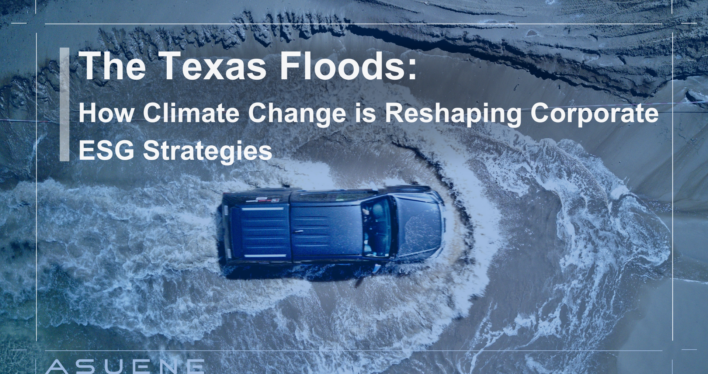- Article Summary
-
Overview
Texas is currently experiencing increasingly severe flooding events, highlighting the growing reality of climate change impacts. These floods have not only disrupted local communities but called attention to corporate attitudes toward Environmental, Social, and Governance (ESG) strategies. This article explores how extreme weather, driven by climate change, is forcing businesses to enhance their ESG frameworks, focusing especially on resilience, transparency, and sustainability.
Texas Floods: A Climate Crisis in Action
Historically, Texas has always been susceptible to floods. However, the frequency and severity of these events have increased markedly in recent years. From Hurricane Harvey in 2017, which inundated large parts of Texas causing unprecedented damage, to the recent catastrophic flooding in 2025 driven by severe drought conditions in central Texas, flood events have become increasingly devastating. The bone-dry soils from prolonged droughts have severely impaired the land’s ability to absorb intense rainfall, leading to rapid river surges and flash flooding.
These climate-driven disasters have collectively resulted in billions of dollars in economic losses, displaced countless communities, and caused severe disruptions to infrastructure. According to AccuWeather, preliminary estimates place the total damage and economic loss from recent floods at $18 billion to $22 billion, accounting for damage to homes, businesses, campgrounds, recreation facilities, disruptions to commerce and supply chain logistics, financial losses from extended power outages and road closures, and major travel delays.
Climate scientists affirm that global warming intensifies these extreme weather events. Warmer temperatures contribute to higher moisture levels in the atmosphere, fueling intense rainfall events and increasing the likelihood of severe flooding. Texas, with its extensive coastlines and rivers, is especially vulnerable.

Corporate ESG Strategies: Integrating Risk Management and Scenario Analysis
In response to escalating flood risks, corporations operating in Texas have been urgently reassessing their ESG strategies. Businesses across various industries, such as energy, real estate, manufacturing, and logistics, now recognize the critical importance of proactively managing climate-related risks to ensure operational continuity and sustainability.
Companies are increasingly integrating sophisticated risk management frameworks into their ESG strategies, prominently featuring tools like the Task Force on Climate-related Financial Disclosures (TCFD) recommendations and scenario analysis. These methodologies help businesses systematically evaluate potential climate-related impacts, enabling better-informed decisions about infrastructure investments, supply chain adaptations, and long-term sustainability objectives.
Notably, Texas-based energy corporations, traditionally hesitant about ESG initiatives, now lead with aggressive net-zero commitments, reflecting a strategic shift toward addressing climate vulnerabilities head-on through scenario planning and proactive risk mitigation.
Building Resilience: The Future of Corporate ESG Strategies
In response to heightened ESG pressures and climate risks, businesses are adopting innovative strategies to build long-term resilience:
- Infrastructure Adaptation and Green Buildings: Corporations are investing in flood-resistant infrastructure and sustainability-certified green buildings designed to withstand extreme weather events.
- Sustainable Supply Chains: Enhanced transparency and contingency planning within supply chains are becoming central to ESG strategies, reducing vulnerability to climate-related disruptions.
- Climate-Tech Investments: Many companies are channeling funds into innovative technologies for flood prevention, climate adaptation, and renewable energy.
Corporations are also forming strategic partnerships with governments and non-governmental organizations (NGOs), fostering collaborative approaches to strengthen community resilience and sustainability efforts. For example, recent partnerships between tech companies, Texas municipalities, and NGOs have led to investments in advanced flood-warning systems and improved urban planning initiatives.
Conclusion
The severe flooding in Texas is a stark reminder of how climate change is already reshaping the corporate landscape. Businesses can no longer ignore ESG considerations or treat them as secondary priorities. The shift toward proactive ESG strategies, emphasizing climate resilience, transparency, and sustainability, is not merely investor-driven, it’s a necessity.
Companies around the world can learn from Texas’s experiences. By embracing robust ESG strategies today, corporations can safeguard their future and contribute meaningfully to global efforts against climate change. The floods in Texas are not merely a crisis; they are an urgent call to action for every corporate leader committed to long-term viability and sustainability.
Why Work with ASUENE Inc.?
Asuene is a key player in carbon accounting, offering a comprehensive platform that measures, reduces, and reports emissions, including Scope 1-3. Asuene serves over 10,000 clients worldwide, providing an all-in-one solution that integrates GHG accounting, ESG supply chain management, a Carbon Credit exchange platform, and third-party verification.
ASUENE supports companies in achieving net-zero goals through advanced technology, consulting services, and an extensive network.


